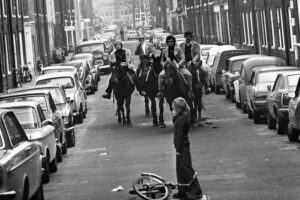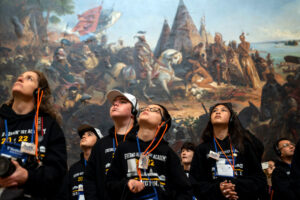Writing from the Vortex of War
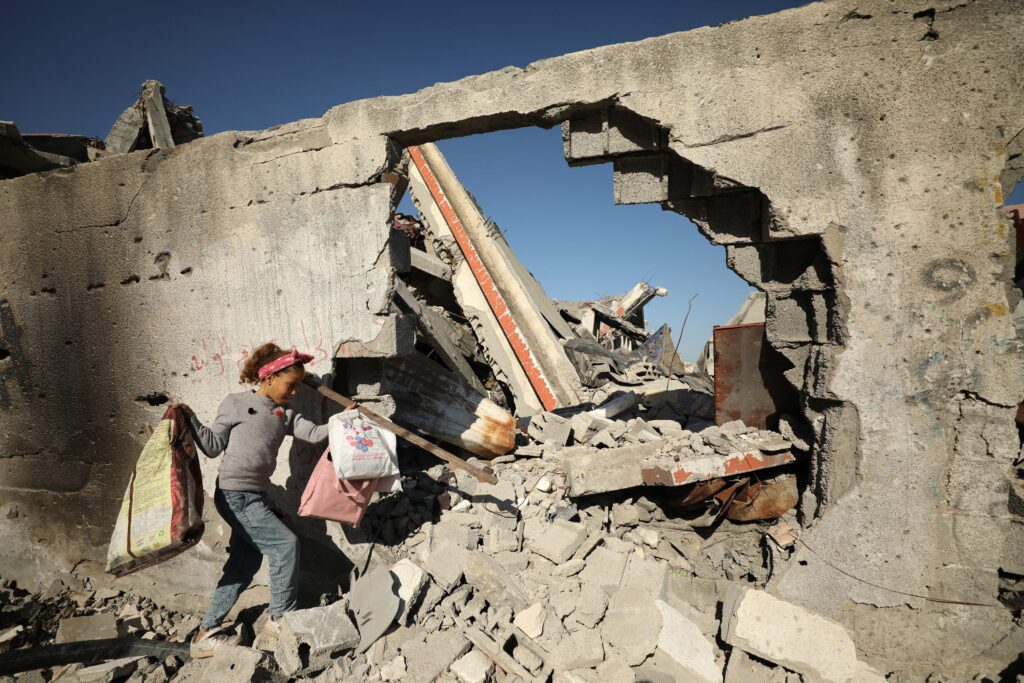
Translated into English by: Katharine Halls
After much wrangling and back-and-forth with myself, alternately accepting and refusing, believing and disbelieving, asking what the point would be, I have decided to start writing. 106 days since we were suddenly, startlingly, swept into the vortex of war once again, I am writing so as not to become brutalized, so as not to be consumed by the pitiless machine of war and turned into a monster in a dark hole.
I have spent days paralyzed, disoriented, doubting the truth of what is happening, and all the while running the grueling course that is daily life under wartime conditions: endless queues and unimaginable humiliation for a few rounds of bread or a gallon of drinking water or a gas canister that will save us having to cook our meals on an open fire, and the constant struggle to keep up with fast-moving events, which spread dementedly from one part of Gaza to another. Running in these never-ending circles, with the convoluted details and heart-rending sights they bring, occupies all my days. There is never a moment to contemplate the turn of events that has made all forms of life in Gaza into a perpetual hell.
It came all at once, smothering every last comfortable and pleasant space I was blessed with before the war restarted. My summer of 2023 was overflowing with life. Between my various jobs, I was busy at all hours, but I still made time now and then to meet up with my friends, who were much less busy than me, to play cards on the beach at Khan Younis.
For a person like me who doesn’t like sitting around at home, it was the perfect summer. I felt at ease when life was busy and noisy, full of experiments, shared projects, work, and endeavors; maybe they were my refuge from what things were really like in Gaza, a city which over the last seventeen years had suffered more kinds of pain than a person can count.
Although the situation in the city had improved marginally, the general environment remained intolerable for whole swathes of society, particularly young people, who were leaving in droves. Whole neighborhoods were left empty of young people after successive waves of mass migration. They plotted their journeys to Europe together, all different, but unfailingly dangerous. These waves of youth emigration had reached a frenzied pitch by summer 2023, as a result of the unbearable conditions Gaza was forced to endure.
My own feelings were so numbed that I didn’t pay much attention to people’s suffering. Like others, I was accustomed to the situation and I made the best of it. Keeping busy saved me from drowning in Gaza’s oceans of pain. We thought we’d reached the lowest point after seventeen years of siege, and seventeen waves of killing that ranged from assaults lasting a few days to more major escalations, on top of the poverty, unemployment, crime, addiction and endless other social problems we lived with. We didn’t know that months and months of new pain awaited us, and would make everything we’d been through so far feel like pinpricks by comparison.
8 October, leaving home
The night of Saturday 7th October was an ordinary night in Gaza; nothing on the horizon suggested anything was about to happen. I’d come home late after a long day during which I’d attended the burial of a cousin who’d died after a short battle with mouth cancer. He was a charming, funny man whose approach to life I envied. He was the life and soul of our family get-togethers, a magnetic presence full of jokes and caustic commentaries on Gaza’s political and social life whom everybody gathered around, especially the younger members of the family. When he started getting toothaches regular painkillers didn’t seem to help, so he went to see a doctor who ordered some tests, and after a biopsy was performed on a small swelling in his jaw, he was told he had cancer. The family were stunned. He began a treatment journey that began in Gaza then took him to Ramallah, back to Gaza, and then to Jerusalem for chemotherapy. He died six months after his diagnosis. Even though all the signs had suggested this was how things would end, the family were devastated. And his death seemed to be an omen, because before the days of mourning and condolences were out, Gaza had found itself in the blazing furnace of war.
I was exhausted after the long, somber day, and quickly fell into a deep sleep, which is where I was when all hell broke loose at around 6:30 the next morning. It began with the terrifying sound of bombing—huge missiles in large numbers, coming from every direction all at once—which woke my wife and three children. I rushed into the children’s bedroom to try to calm them down; they and their mother were petrified. The sounds of rockets and explosions went on continuously for over half an hour, and for the duration of that half-hour, a single question—instinctive, spontaneous, yet for the time being unanswerable—revolved in my head: What was happening?
The sounds gradually tailed off, to be replaced by the hubbub of voices outside in the open square of Hamad City residential complex, in Khan Younis, where we lived. The voices were many and mingled, so you couldn’t make out anything they were saying. I ran downstairs to try to find out what had happened. What had happened was a surprise large-scale attack on the settlements and military positions adjacent to the Gaza Strip, an event which was quite possibly unprecedented in the history of the Palestinian-Israeli conflict. I gazed at the street around me. Agitated and confused, people were moving in every direction: some were leaving in cars, others were hurrying to nearby grocery stores to buy provisions, others were looking for transport to take them to relatives’ homes. People in Gaza had lived through so many wars they’d got into the habit of gathering in the family home whenever a new war broke out, to help them feel safer. A rush of chaos and anxiety had possessed the neighborhood, and in the midst of all this confusion and motion I stood silent and stupefied.
I retraced my steps up to the flat, and told my family that war had begun and that we needed to decide if we were going to evacuate, like others were doing, and move to the family home in Khan Yunis Camp. Ula, my wife, didn’t want to go. I felt unable to make decisions or think clearly. We were adrift in a mix of fear and bewilderment at the conflicting news we were hearing, as well as being taken utterly by surprise. With every minute that went by, as we found out a little more about what was going on, my fear and shock increased. Just then, my phone rang, and I answered to find my older brother on the line, his voice heavy with fear and uncertainty. He also lived in Hamad City complex, but he had more accurate news than the rumors doing the rounds, which people were repeating without knowing whether they were true or not.
He told me tensely that there was a long and brutal war ahead and that we couldn’t stay where we were. We needed to move right away to Khan Yunis Camp where the family home was. He’d decided quickly and was already there with his family even though in those first few hours it didn’t necessarily seem justified for people to leave Hamad City. But since it was a newly built neighborhood in a relatively isolated area at some distance from Khan Yunis city center, people quickly found that they needed to move into the city to be closer to the hospitals, markets and UNRWA schools which become shelters for displaced people during times of war. My brother and his family had survived certain death during the war of 2021 when Israeli planes bombed a flat in the building directly next door to his, in the Amal neighborhood of Khan Yunis, and destroyed whole sections of his flat. He and his family were at home at the time, and it was only by a miracle they weren’t all killed. When we went to see the house, we were staggered that they’d escaped unharmed. My brother was deeply shaken, and the shock stayed with him for many months afterward. Although they managed to rebuild the flat, my brother decided to sell it and buy a new flat in Hamad City, because he couldn’t stay in a house where the very walls made him think of imminent death. After that experience in 2021, any disturbance made him and his family feel especially claustrophobic and afraid, which was why he’d so swiftly moved to the family house while I sat for an hour agonizing over whether or not to leave the flat I’d only just finished renovating a week earlier. Ula was refusing to leave. The flat was her personal heaven, the place where she felt most comfortable.
In the four years since we’d bought it, we’d put lots of thought into decorating and furnishing it together, and she’d paid attention to every detail: the paint colors, the design of the curtains, the sitting room suite and the children’s room. She felt safe and comfortable in the flat in a way I couldn’t identify with; I shared her feelings to a certain degree, but in general I had a stronger relationship with the family home in Khan Yunis where I was born, and where I had memories of my childhood in the streets and alleyways of the camp, of early adolescence and the blossom of new experiences and tastes it brought me. I was certainly attached to the flat in Hamad City as the fruits of my own hard work and patience, yet it still felt more like a hotel to me, a place to spend the night after a hard day at work followed by evenings spent loitering in Gaza’s cities and neighborhoods.
After some cautious discussion and back and forth with her, I decided we should vacate the flat and go to the family home in Khan Yunis Camp. That was to be our first displacement. We quickly packed a bag of clothes and some blankets, and another small bag with our papers, ID cards and passports, and then we were ready to leave. It wasn’t easy finding a taxi to take us to Khan Yunis Camp, because people were on the move and there weren’t enough taxis in Hamad City to cope, so I called the city taxi service. They told me I’d have to wait half an hour, when usually it only took three or four minutes, because so many people were trying to leave. The half-hour felt like an age. I don’t know why I was in such a hurry; at that point, we were still taking in what was happening and working out its dimensions and possible repercussions, no more. Maybe I just needed to talk to my father and brothers so we could all absorb together what was happening, then attempt to anticipate what would come next and share the fear, which was growing to the point it was getting out of control.
The taxi finally arrived, and I quickly loaded up the bags and got the children, Baraa, Jawad, and Basel, into their seats. We set off. We couldn’t believe what we were seeing as we drove: Israeli army jeeps on the roads, surrounded by people, everyone in a state of shock. The jeeps were driving like crazy in all directions, and columns of smoke were rising all along the eastern side of Salah al-Din street. People’s conversations sounded like they’d come straight out of a film: there were four soldiers lying on the ground, large numbers of people had succeeded in entering military positions and settlements. There were unbelievable reports coming in, each new piece of information bringing intensified fear, expectation and shock. When we reached Khan Yunis Camp, the neighborhood was in a state of anxiety and alarm, neighbors and relatives gathered here and there in groups and pairs outside, while military jeeps roamed the streets and the sound of gunfire came from all around. I was gripped by a desire to get into the house as fast as possible without having to talk to anyone. Inside, my father and all my brothers, and my mother and sisters, were in a state of fear and dismay. We didn’t want another war. Why was this happening? Israel was going to torch Gaza. The atmosphere was suffocating and tense with anticipation.
I sat down and silently smoked a cigarette, still overwhelmed by shock and fear.
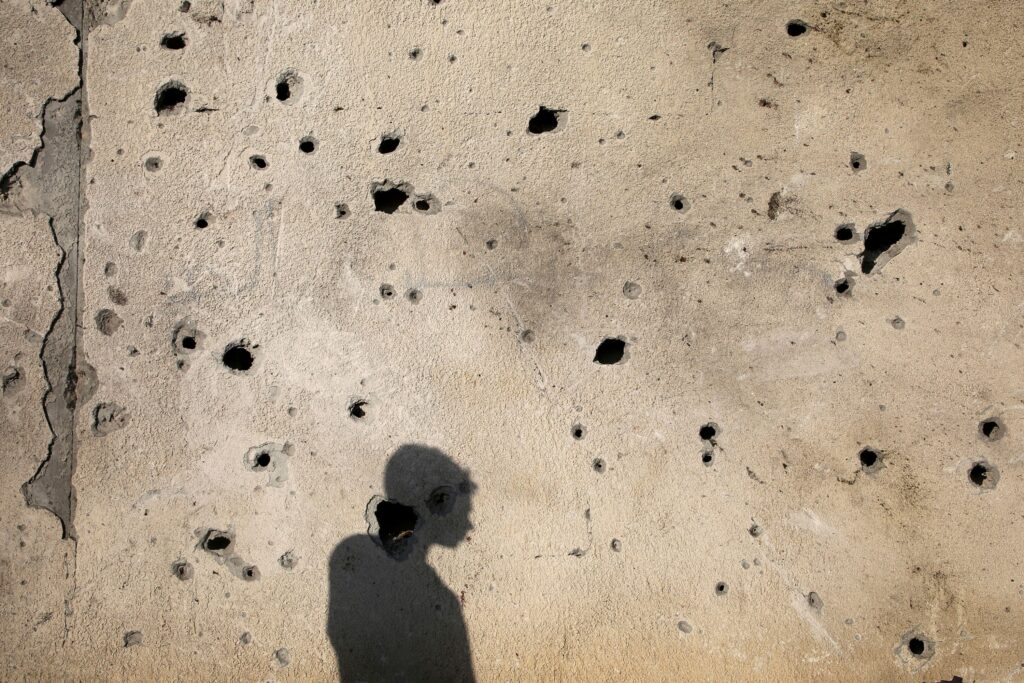
A month later, after returning home
So this is hunger. A new war raging within the war of missiles and bombs, a war no less brutal or mighty than the one searing us with its fires and sending us running to escape its crushing force. Hunger came for us in our home, as it did for others. We eat one meal a day now, halfway through the day. In the morning, a few biscuits are shared out between the children and then the adults, and in the evenings, we make do with tea.
Shortly after flour disappeared from the market, it began to circulate again in the form of sacks intended for distribution by UNRWA. This sudden appearance was the result of looting of the UNRWA warehouses, which we only heard about afterwards: crowds of hungry people had stormed the warehouse, some breaking down the doors while others scaled the walls, and emptied it of its supplies—not only flour, but also tinned sardines, corn oil, milk powder, and dried lentils and chickpeas—in a matter of minutes. Apparently they’d even taken wooden desks and shelves and the agency’s archives. I bought a sack of looted UNRWA flour for over four times the usual price, and made my way home as if bearing some priceless treasure. Ula and her sisters were jubilant, and we were all seized by a dark joy amid the wasteland of fear and grief that grows vaster and more desolate by the day as the war continues to escalate. We felt momentarily comfortable and safe; we could bake our own bread now, instead of waiting under the hot sun for hours in the uncertain hope of finding some at the bakery. But another problem stood in our path: to turn the thin rounds of dough into bread, we needed an oven, and all we had in the flat was a gas canister that barely sufficed to cook our regular meals. We would have to find some other way.
Mud ovens, which is what rural Gazan families have always used for cooking and baking, are dotted all over the green patches that lie between the apartment blocks in Hamad City. The women they belong to are generous and gladly volunteer their help when other families turn up needing to bake something, only asking them to bring enough paper and cardboard for fuel. But we didn’t have any paper or cardboard in the house—just my books. Ula looked at me timidly. “Let’s use one or two for now, and when the war’s over you can replace them,” she said as gently as she could. “The kids need food more than they need to be read to.” The ugliness of it was devastating. In all the years I’d spent amassing my modest library, it had never occurred to me that I might one day have to weigh a book against a piece of bread for my children. I was stunned by the cruelty of the choice, paralyzed by the question it raised: how had things got this bad, this fast?
I’d collected my books over many years, and I had around two hundred now, including works on philosophy, society and religion, novels, and poetry collections gifted to me by friends at their book signings, with dedications hand-written in the front pages. The books felt to me like part of a shared memory belonging to all those people, some of whom were still in Gaza, some of whom had gone abroad, and some of whom had died while searching for life. The more I thought about it, the clearer the feeling burned: my library was a pulsing bundle of flesh and blood and memories and lives and errands run in Gaza’s streets and alleys and evenings spent in cafes and on the seafront in summer and in winter.
Which is why I replied, “I’m not going to burn a single page of a book. There must be some other solution.” Ula realised her gentle pressure hadn’t worked. “Never mind then,” she said. “We just have to get hold of some paper somehow, so we can bake the bread before it goes bad.”
I went downstairs and headed out, thinking I’d find a stack of empty boxes lying next to the garbage containers or outside a grocery stores. But as I walked down the street, there wasn’t a scrap of paper or cardboard to be seen. People had used up everything they could find in the garbage containers, and as I searched, I realized others were searching with me. Young and old alike were raking the ground with their eyes, all looking for paper to give to the village women so as to bake their bread. I wondered for a second if there might be none to be found anywhere in Hamad City, and I was overcome by a crushing sense of despair as I looked left and right, running now, chasing the paper mirage. I nearly went back to the flat and took two books from the shelves, and would have burned them to bake bread for the hungry children had not the owner of the store beneath our building intervened. He seemed to have been watching me on my search, and had finally decided to help me when he saw I was losing hope.
“You’re looking for cardboard boxes, aren’t you?” he asked. “Do you have any?” I replied eagerly. “Here,” he said, handing me three large pieces of cardboard, “Nothing’s too precious for you.” I thanked him several times before racing back upstairs, happy and proud, and grateful to the man for rescuing me from the sea of regret I’d soon have been drowning in had I begun to burn my library.
They were only a small and humble collection of books, but to me they were the souls of the people who’d written them—and this was no metaphor or poetic image, but a truth I had felt for many years.
The November ceasefire
The temporary ceasefire in November was over in a matter of days. We’d hoped it would be extended, and maybe even signal an end to the war, but it fell apart on the morning of the seventh day. I’d woken up early to find out what was going to happen, and when I heard a huge explosion that rocked the city, I knew that our temporary reprieve from the killing was over. We would have to ready ourselves for the next wave of death, destruction, and destitution. The Israeli raid targeted a residential apartment in a block next to the building where my older brother’s apartment was, but he and his family had left, to my immense relief. He called me later on and asked me to go to the site of the bombing to check all the windows were intact and the front door still locked shut, because they could easily be blown in by an explosion so close by. When I got there, there was simply a void where the building that had been targeted used to be, but my brother’s building was unscathed and its windows unbroken. As I called him back to let him know his home was safe, the sense that we too should leave was already encroaching upon my thoughts. The ceasefire we’d placed our hopes in was over already, the bombardment of the city seemed to be intensifying, and we’d been hearing news of Israeli plans for a ground invasion of Khan Yunis. I needed to make a decision in good time, I told myself, because leaving at zero hour would be dangerous and frightening. I wanted to have left the city well before any ground invasion took place, because it would be near impossible to move around while an invasion was underway, and I had not only my own children to consider but also my in-laws, who were staying in the flat with us. My thoughts began to whirl once again, I felt sick with worry and fear, and before I knew it I was thrown back into the maelstrom of wretched confusion where I’d spent so many days the first time I decided to move my family to my parents’ home in Khan Yunis camp.
My wife Ula’s family felt comfortable and safe in the apartment, even though we were all concerned and afraid now that the ceasefire had come to an end and residential areas in the city were being bombed. Whenever I tried to prepare the family for the prospect of leaving home and moving to the Amal neighbourhood, where my in-laws had sheltered at her sister’s place when they first left their home, I was met with refusal and a stubborn insistence we should stay put. All indications were that something major was going to happen, and yet I didn’t want to put pressure on them to leave; after all, it was my house, and any insistence on my part might be misunderstood by my guests. So I resolved to keep quiet, and wait and see what the days would bring, in the hope that matters would arrange themselves without putting me in an awkward position with my in-laws.
I didn’t have to wait long. Night had fallen, pitch-black and silent, on Hamad City’s lines of apartment blocks. People were fast asleep, weary from weeks of accumulated exhaustion, and I too was in bed, when an enormous bombardment began at around 2:00am, with dozens of planes pounding the outskirts of the city and the nearby agricultural lands. It wasn’t just one or two raids, but dozens in rapid succession. The city was lit up by the red and yellow glare of explosions so bright it could have been broad daylight. Terrifying, ear-shattering sounds shook the entire city without break. The bombing was so vicious it seemed it would obliterate anything in its path. Everybody in the apartment was immediately awake, and hurried in terror into the narrow passageway between the sitting room and the kitchen, where we huddled on the floor, wide-eyed in shock and fear. What was happening?
This was insanity. It couldn’t be normal. Each time we got over the terror of one raid, another more forceful came fast on its heels. The three children were in a state of hysteria none of us could allay. Some of the adults were trying to calm Jawad and Basel down, while Baraa clung to me, shaking, his body cold with fear, his lips blue, his teeth chattering, and his heart pounding so hard it mirrored the explosions outside. As I held him close, I felt every tremor of his fear as if it were in my own body. I tried to convince him that we were safe, that the bombing wasn’t as close by as he thought—even though the sounds were really really loud, even though he could see the bright glow of the explosions and smell their acrid gunpowder smell, even though he could see that I was frightened and trembling just like him. It was as much use as trying to convince fire that water couldn’t put it out, but I persisted. I was worried he might die of fear otherwise.
Just a few hours more and the sun would rise, I told Baraa, and then we’d leave the apartment and go somewhere safer. He took hold of this idea, and as dawn approached, he reminded me insistently that we had to leave, telling me he wanted to go somewhere safer. But while Baraa was appealing to the sun to rise, I was berating myself for being so selfish and irresponsible as to have had a child in a place condemned to death like this, and for being so useless that I couldn’t even reassure him I would keep him safe from death. How could I explain the complicated truths of the life we were living to a child as young as him? I couldn’t. What a sin I’d committed by bringing him into the world. It was unforgivable.
Before we left, I thought of making a quick tour of the apartment—a farewell glance, perhaps, a last look at our home of four years, which held all our memories and secrets and emotions and joyful occasions—because who knew when we’d be able to return? But I pushed the thought aside. I won’t say any farewells, I said to myself. Farewells are bad luck. No need to make such a big deal about it. We’ll be back soon.
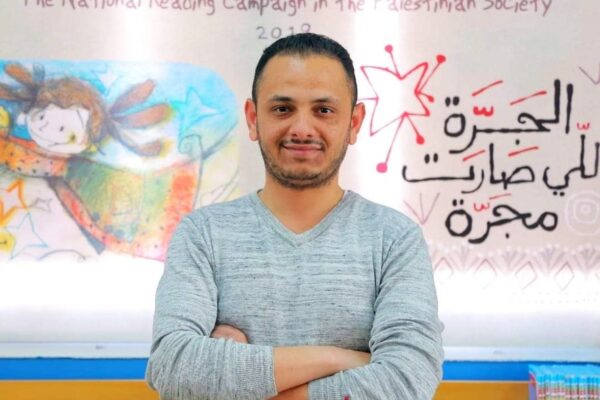
Postscript:
Muhammad and his family now live in a tent in Rafah and have moved repeatedly in an attempt to remain safe from Israeli military assaults. He briefly returned home before the flat was severely damaged in November, along with the family’s belongings, including his books. Muhammad started writing again in February 2024, as a way to face, in his own words, the ‘savagery’ he’s been living through and witnessing since October 2023.
